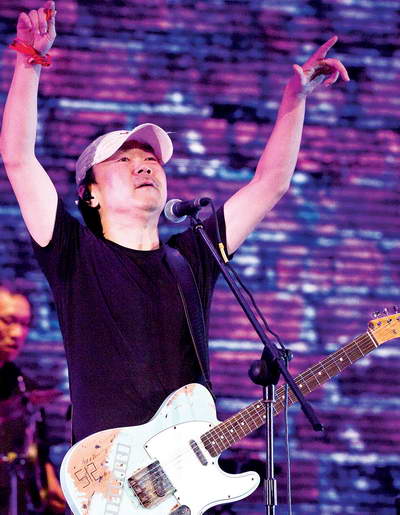Cui Jian rocks again in Beijing
|
|
He was the voice of China's "angry youth" in the 1980s and his feet have been firmly planted on the rock 'n' roll stage ever since.
"The best way for me to die is on the stage," said Cui Jian. "For a rock musician, the stage is my battlefield."
On December 24, the Godfather of Chinese rock 'n' roll took the stage at the Beijing Exhibition Center, twenty years after his debut as a classical musician-turned-rebel with an electric guitar.
For older audience members, it was a waltz down memory lane as Cui Jian sang a reprise of his greatest hits, including "Nothing to My Name," "Rock 'n' Roll on the New Long March" and "Greenhouse Girl."
"The concert is billed 'Rock and Roll on the New Long March V21,'" explained Cui, "21 stands for the new millennium, as well as the prelude to a new chapter."
"Many years have passed and I'm still playing rock 'n' roll. I never attempt to transcend the time I'm living in. I only want to transcend myself," he added.
As usual, Cui's performance attracted a sell-out crowd. A fan waiting outside said "Nothing to My Name" described many of Cui's followers. "The penniless audience can't afford Cui Jian's concerts any more."
Born into a musical family in Beijing, Cui Jian was 14 when he began his training as a trumpet player. In 1981, he became a member of the Beijing Philharmonic Orchestra.
At the same time, he fell under the influence of Western rock music. He learned to play guitar and soon began to sing in public, inspired by the likes of Bob Dylan, John Denver and Simon and Garfunkel.
By the mid-80s, Western rock music had fully emerged in China. The Beatles, The Rolling Stones, Talking Heads and Police all had their influence on Cui Jian. The result was the formation of Seven Ply Board, one of China's earliest rock bands, gathered together by Cui and six other musicians.
"The Chinese people should have had rock music to reflect a rebellious spirit a long time ago," said Cui, "Over the past 2,000 years since feudal society, there had never been any single generation in China questioning mainstream culture. The questioning had all come from individuals. And now comes a new generation in the 80s, and hence the rock culture."
In 1987, Cui resigned from the Beijing Philharmonic Orchestra and worked with ADO, an innovative Beijing Band which included two foreign embassy employees, Hungarian bassist Kassai Balazs and Madagascan guitarist Eddie Randriamampionona. They brought new rhythms and dynamism to Cui's tunes.
With ADO, Cui Jian released his first album, "Rock'N'Roll on the New Long March," featuring one of his best-known singles, "Nothing to My Name." The album soon established Cui as the spiritual symbol of a new generation in the 1980s, the so-called "angry youth" expression of such weighty issues as individualism and sexuality.
"I think rock music represents many elements, the most prominent one being a critical attitude," Cui said. "The reason why many people regard me as a cultural symbol is because I represent a different voice from the government, a voice of discontent and seemingly angry complaints, as we come to realize that without complaints, society will stop evolving.
"Our rock music is characterized by the turmoil of adolescence. It's masculine, aggressive and fun, like Jiang Wen's films."
Over the past two decades, Cui Jian has performed in Europe and the United States, while continuing his rock concerts in Asia. His artistic and intellectual influence on culture and society has earned him the Dutch royal family's prestigious Prince Claus Award in 2000.
In 2000, Cui was again the focal point of international media coverage when he initiated the Anti-Piracy Concert held at Beijing Workers' Stadium. "A country without independent thinkers will remain a processing warehouse," Cui stated.
In 2002, he set out on a campaign against fake vocals, the "lip-sync" phenomenon in which performers simply move their lips and mouth the lyrics of recorded songs.
The practice has prevailed in China's show business industry.
"I felt obliged to call people's attention to the poor working environment of Chinese musicians. In China, genuine singing is hardly heard in concerts, gala spectaculars and TV shows," said Cui.
"Live music is dying and the whole CD industry is devastated," he was quoted in a recent interivew with Pheonix TV. "In my opinion, all the musicians in the world should stand up and boycott the MTV channel. MTV is a golden coffin. They dig tombs for musicians, bury them alive and then leave."
The year 2002 saw Cui's influence extend to a broader music scene when he initiated, produced and played at the "Snow Mountain Music Festival" in Yunnan Province. It was a major rock festival in the trend toward outdoor music events in China, providing a glimpse of hope for the decaying rock industry.
"The past two decades have witnessed an excessive economic growth in China," Cui concluded. "All we can do is fasten our seat belts for the roller coaster ride, and pray our souls to survive."
 0 Comments
0 Comments








Go to ForumComments